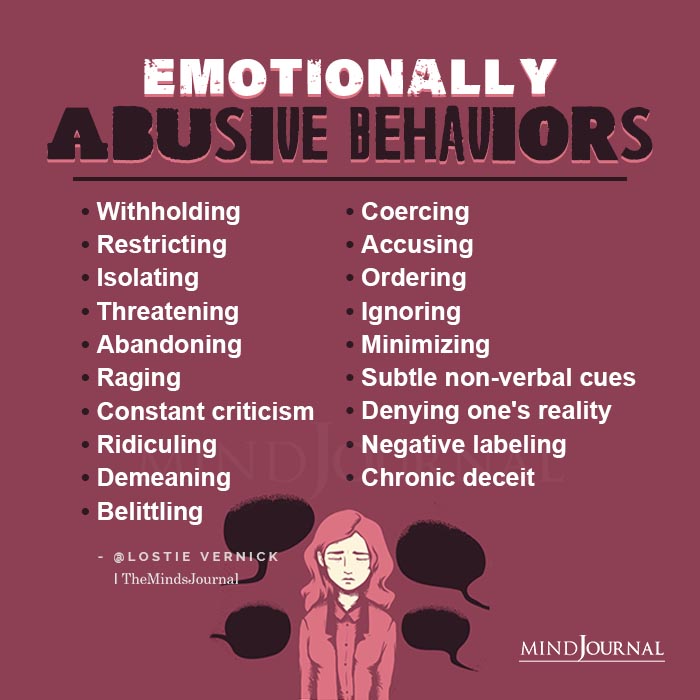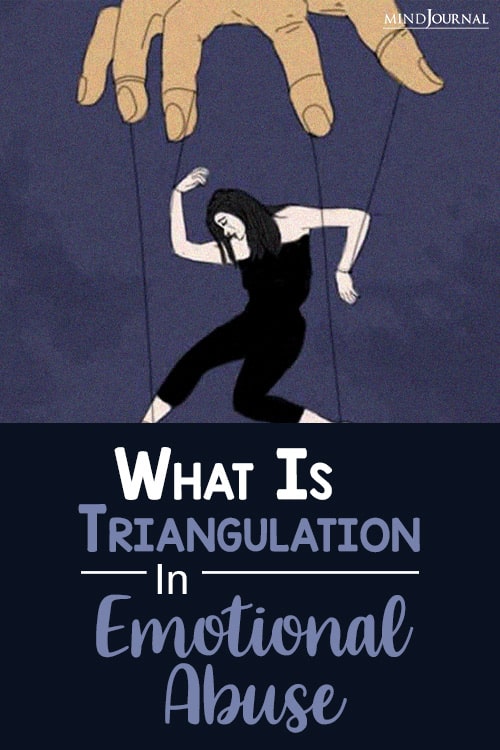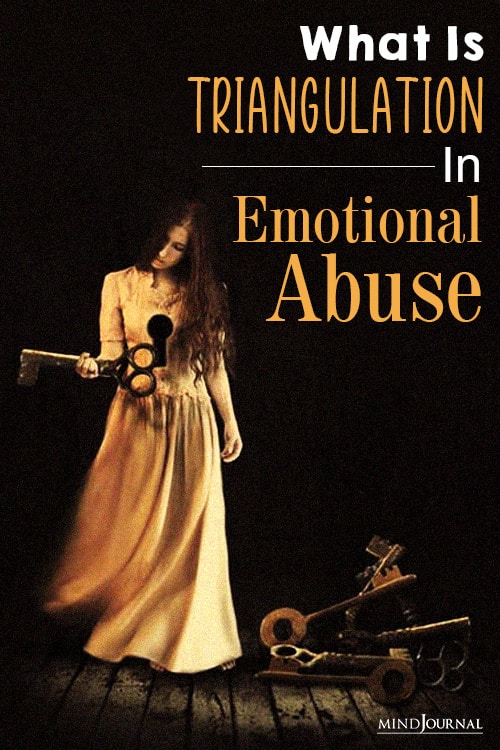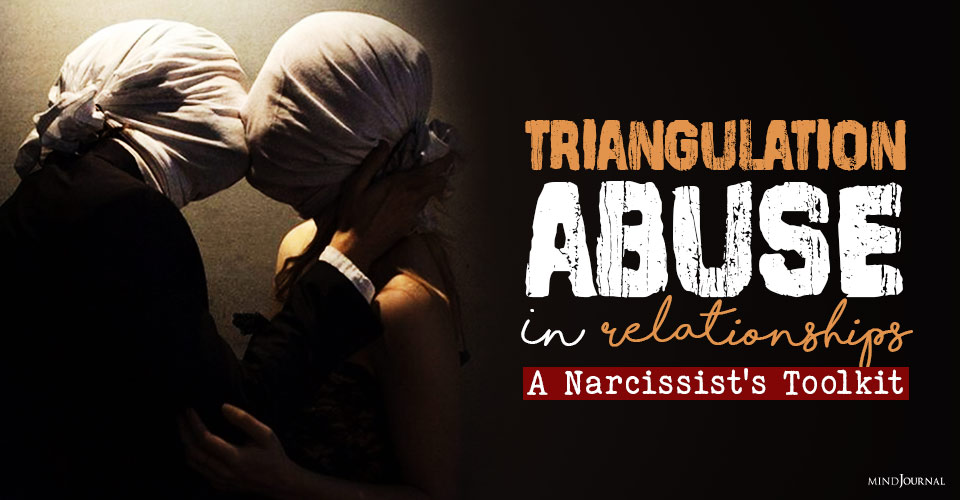Triangulation abuse is commonly used by people with a narcissistic personality disorder or narcissistic tendencies to maintain control by manipulating others.
“Triangulation is the way the narcissist maintains control and keeps you in check – you’re so busy competing for his or her attention that you’re less likely to be focusing on the red flags within the relationship or looking for ways to get out of the relationship.” — Shahida Arabi
If you’re like me, you’ve encountered the triangulation term while researching the ins and outs of emotional abuse. It probably sounded a lot like something you’ve experienced, but you want some more information to be sure.
Well, if you’ve landed here, I’m going to go out on a limb and say you’ve been a target of an emotional abuser’s triangulation methods. But just to be sure, we’re going to dive into this topic to discuss what triangulation looks like in various scenarios.
What Is Triangulation In Relationships?
Triangulation is one tool in the emotional abuser’s toolkit. And it’s important to remember that it’s one of many. To create the triangulation effect, the abuser must create a triangle of sorts.
In the triangle, there’s you, the abuser, and at least one other person (or sometimes a pet).
To really understand this concept, think of this triangle as inverted. There are two points at the top and one at the bottom (the opposite of a typical triangle). To the emotionally abusive person, they are at the top of the triangle along with someone else. Spoiler alert: It’s not you.
But this is only for appearances. Oftentimes, abusers who rely on triangulation are narcissists. And to the narcissist, no one shares the top of the pyramid. At least, not really.

Related: Have You Been the Victim of Narcissistic Triangulation?
The Goal Of Triangulation Abuse
As with all types of emotional abuse, triangulation is a form of manipulation. The abuser wants the target to feel like they have to compete with another person for their attention, respect, and/or admiration.
You might be seeing the connection with narcissism here. What better way to feel on top of the world than to have people vying for your respect and attention? And what better way to control a target than to make them think it’s all a game they can “win?”
Why Triangulation Often Goes Undetected
If you’re just realizing someone has used this technique on you, you might be waking up to the fact that all the drama in your relationship was well-orchestrated. This is a very tough pill to swallow for most of us. But don’t feel bad.
Triangulation often goes undetected, and there are a few reasons why.
1. We want to see the best in people – Many people who fall prey to an emotional abuser are empaths or Highly Sensitive People (HSP). We have trouble believing that anyone would intentionally hurt another. This isn’t true for all targets, so if you don’t think this applies to you, read on.
2. You may have a lean towards co-dependency – This is another tough pill to swallow, but if you truly want to learn and heal from this experience, you must look inward. Someone who is even slightly co-dependent is more likely to ignore warning signs (see #1) if there’s good in the relationship.
3. It’s all you’ve known — If you were born to an emotionally abusive parent, this is all you’ve ever known. And there’s a good chance you’re attracting relationships where you’ll suffer similar abusive tactics. That is until you learn that you’re the stable one and can move on to make healthier choices.
4. Triangulation is often super subtle – Especially, in the beginning, triangulation can be tough to detect. The person may say something that sounds off, but you brush it off and get on with your day. Even over time, depending on the person, triangulation can be subtle. You know this person’s words and actions trigger a reaction in you, but you think (or are led to believe) there’s something wrong with you.
Examples or Types Of Triangulation
There are two very common situations where a narcissist will use triangulation against their target. Below are some examples of Triangulation.
1. Triangulation in romantic relationships
There are so many ways a narcissist or emotional abuser can use triangulation in a relationship. You may relate to one or all of these examples.
Related: Understanding Narcissist Triangulation And The Love Triangle
2. Emotional triangulation with exes
In romantic relationships with narcissists, triangulation with an ex is very often present, and it could be with exes who are “friends” or even exes who have gone no contact.
An emotionally abusive ex-partner of mine would triangulate with an ex who was still very much in his life. He’d talk about how they were so close and such great friends, and he’d go on about how much respect he had for her. Could it be that they were just great friends? Probably not when he was sleeping at her house every chance he got.
But aside from that, one way I know its triangulation is that he would never in a million years have told me he respected me at that time. In fact, when I directly asked the question, he’d get dodgy and changed the subject. Triangulation wouldn’t have worked if he elevated me too. So he made sure he never did.
I’ve talked to a lot of people who have experienced similar things. It could come in the form of name-dropping an ex’s name whenever you’re feeling great. Or it could be keeping in touch with an ex’s family (to an extreme) after the breakup or “confusing” your name with an ex’s.
Alone, these things are nothing more than red flags.
But here’s the thing…
You’ve undoubtedly mentioned the hurtful behavior to your partner. If he or she hasn’t stopped, it’s intentional. If you’re noticing a combination of triangulation techniques, it’s intentional. There’s nothing more to investigate. If you’re made to feel like you have to compete with an ex, you’re a target of triangulation. It’s time to break the cycle.
3. Emotional triangulation by a narcissistic parent
I don’t have personal experience with this one, but I can tell you what I’ve learned from research and others who have grown up with narcissistic parents.
Oftentimes, not always, the narcissistic parent will have a “golden child.” This child is the one who gets the majority of the praise and attention. Depending on the person’s level of disorder, they may outright put down another child. But in all cases, even those that are subtle, any child who isn’t “golden” will be made to feel inferior.
As a side note, I’ve heard that it’s also very damaging to be the golden child because you feel like you always have to keep achieving in order to be loved. There are no winners when we’re talking about emotional abuse.
Less commonly, an abuser may use a pet (read more about that complicated relationship here) or a celebrity in triangulation. I’ve also heard of cases where an abuser triangulated a target with a deceased ex. Nothing and no one is off-limits. It just depends on the abuser’s level of disorder and your personal triggers. They will push buttons until they find them.
Related: Parental Emotional Abuse: The Unseen Scars Left Behind
How To Handle Triangulation
Now comes the meat of the issue. In reality, it doesn’t matter how other people conduct themselves. What truly matters is how we handle the outside stimuli. And this is a whole lot of “easier said than done” advice, but it’s important. Trust me.
If you’re in a situation where you cannot cut ties with the emotionally abusive person in your life, you need to learn how to handle their triangulation efforts.
It’s all ego
I’ve mentioned above that the abusers in this case are often narcissists. And you may already know that narcissists let their egos run the show.
And guess what…
You have an ego too. We all do. The ego is often called the “false self,” and it describes the thoughts and actions that are meant to protect us from harm.
Here’s a major difference…
In the case of the narcissist, they almost definitely have an impaired sense of empathy. It’s one of the diagnostic criteria. This allows them to allow their ego to manipulate and hurt others with a relatively clear conscience – as long as they’re getting what they want.
In the case of a target, they almost definitely have sincere and strong empathy. This is the opposite end of the spectrum that prevents people from hurting others. But the ego is still there.
If you’ve noticed patterns of triangulation in your life, think about where they’re stemming from. Was there a relationship in your childhood where you felt similar? Are you holding on to unresolved feelings?
Start paying attention to the things that trigger your ego. There’s so much we can learn about ourselves from abusive people. Because they can easily find and target triggers you didn’t even know exist. And once they point them out for you (you’ll know when you’re feeling triggered), dig deep to figure out why that particular thing bothers you so much.
Related: What Is Emotional Abuse? 10 Signs You’re Being Emotionally Abused
And if it’s a relationship pattern that keeps repeating, think about why you might be attracting it into your life. The only way we can heal is to look within.
Now, I’d love to hear about your experience with triangulation. Did you find this article helpful? Or are you still questioning whether you have an emotionally abusive person in your life?
Written By Common Ego
Originally Appeared On Common Ego












Leave a Reply